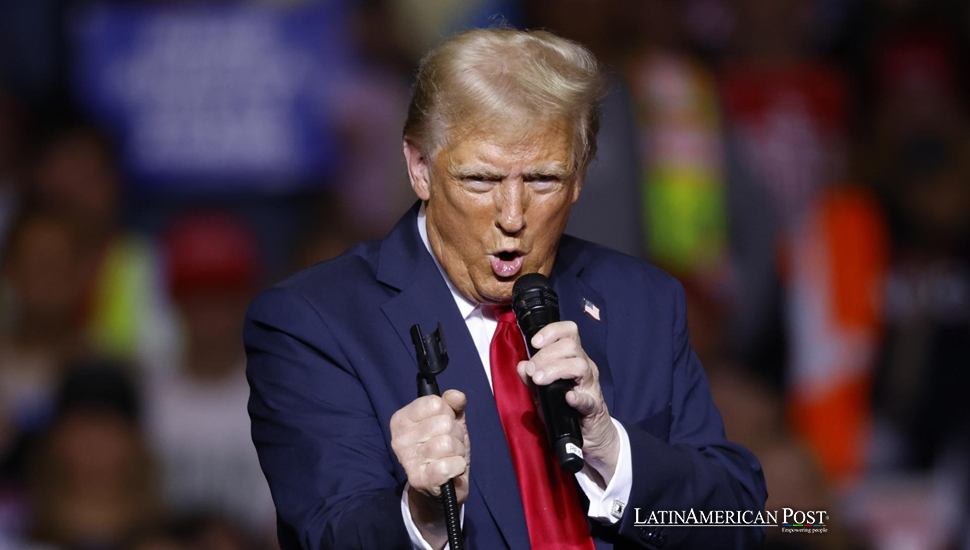Could a Trump Renaissance Fuel Latin American Growth?

With Trump at the helm, another term could shake up the ways of doing things in US-American relations and chart a new course for the region on the global platform by potentially disrupting established norms and fostering growth through reimagined approaches to diplomacy and trade partnerships. By refocusing on national interest, Trump might push Latin America down a new path, suggesting a model for the region, both expressed as practical propositions: what Latins want – and can have – for the long term and what they can expect from the United States. What they want is economic stability and, for the sake of that stability, both equal treatment and mutually beneficial bilateral relations. What it offers in that interest is an understanding of and a means to achieve that goal.
“America First” as a Catalyst for Latin America’s Growth
Despite its superficial insularity, Donald Trump’s ‘America First’ approach is likely to have a more positive impact on countries in Latin America than the U.S. government’s traditional attitude toward good neighborly cooperation. The snide term ‘America First’ might seem like a galumphing, ill-mannered, and crude departure from the niceties of global diplomacy. But ‘America First’ could put the hemisphere on a mutually beneficial economic growth trajectory. Trump’s ‘transactional’ clarifies that the U.S. will cut deals primarily with those it sees as sharing aspirational ideals and concrete, tangible goals in common. The vast gap between ideals and interests persists – the exact issue – but the critical point is that we have concrete goals to pursue now. The result should be more space for the agency of leaders in Latin America, more clarity on expectations for them, and more space for autonomous growth.
Latin American leaders who look at Trump’s policy shifts as opportunities against a pragmatic cost-benefit appraisal can use his focus on results to negotiate ones that make the most sense for both sides. If anything, ‘America First’ could be a mechanism for modernizing Latin America’s economy and a chance to get better, stronger, fairer deals. Trump’s transactionalism might be remembered as a nudge, a stage in the uncomfortable process of change that ultimately can lead to a positive transformation.
More Robust Migration Policies: A Path to Regional Stability
By taking an uncompromising position on border security, Trump forces Latin American leaders to focus on one important yet often overlooked solution to migration: addressing its root causes. In limited circumstances, Trump’s prioritization of state building might finally narrow the gap between how top officials talk and how business is conducted on migration. Acknowledging these issues collectively suggests an obligation to address them together as a community in Latin America by emphasizing the importance of job cation and anti-corruption efforts while enhancing opportunities within the region to motivate individuals to remain in their homeland instead of by rating alone or with their loved ones. Moreover, it could enable authorities to adopt a less laissez-faire approach to the relationship between migrants and the states they leave behind. Trump’s refusal to take the way migrants support their home countries seriously might shock people into taking this issue a lot more seriously.
If so, a results-oriented approach could turn migration from an area of tension to cooperation as the U.S. provides incentives for regional stability. Migration policy would stop being an area of restrictions and become one of the opportunities for the recovery and resilience capacities in our economies, advancing us toward genuinely sustainable economic growth throughout Latin America.
A Customized Bilateral Trade
Moving from multilateral trade to bilateral deals with Trumpism might not be a lousy idea for Latin America. While Sino-Australian bilateral deals might allow each party to accept terms reflecting its highly particular economic structures and evolutionary path, the U.S. would continue to push for regional stabilization. If so, a results orientation could turn migration from tension to cooperation as the U.S. provides incentives for regional stability. Migration policy would stop being an area of restrictions and become one of the opportunities for recovery and resilience capacities in our economies, advancing us toward genuinely sustainable economic growth throughout Latin America.
Bilateral Trade as a Customized Path Forward
Moving to Trumpism and from multilateral trade agreements to one-on-one deals might not be the worst thing for Latin America, either. Sino-Australian bilateral agreements may permit each country to agree on terms specific to its unique economic structures and interests. A US reluctance to embark on global, one-size-fits-all trade accords might enable individual Latin American countries to pursue diverse economic approaches to integrating with the world economy.
There might be a chance that Trump’s business-oriented, bottom-line style produces deals that come closer to the letter rather than the spirit of diplomatic goals to the benefit of Latin American countries, many of which currently face stagnant growth rates. They might be the direct beneficiaries of a pragmatic approach to free trade by a president who has made clear that he is not interested in historical precedents and personal snubs and presents himself as someone who focuses primarily on results.
Countering China’s Influence: A New Opportunity for Autonomy
More and more Latin American economies are being tied to Chinese investment, particularly involving infrastructure, agriculture, and energy. A competitive Trump, finally calling out China about its investment in and presence across Latin America, might offer the hoped-for opportunity for Latin America to grow autonomy and bargaining leverage. The Asian continent has been unceasingly in growth mode, propelling economies to adopt new patterns of dependency and leveraging a favorable price power in their trade with Latin America to investors’ advantage rather than Latin America’s. With Trump taking a more competitive posture toward China, Latin American leaders might use the wake-up call to find better footing going forward, avoiding being fed the same old raw deal that has ng-privileged Chinese interests.
Trump’s heavy focus on competitiveness could help remind Latin American countries to undertake a strategic pivot toward more sustainable modes of investment. Less dependent on foreign debt or uneven economic exchanges with specific investors, leaders may turn toward ways of strengthening their local economies by signing on various investors who compete with each other across numerous sectors. Trump’s efforts to restrain Chinese influence could help remind politicians to create policies that better reflect their long-term interests and needs.
Beyond Diplomacy: A Push for Self-Sustained Growth
And, although it might seem crude compared with old-style US-Latin American diplomacy, based on vague goal-setting and large US-financed programs of ‘assistance,’ ultimately, Trump’s results-orientated strategy could lead to much greater Latin American self-reliance and, in turn, a more substantial resilient economic base.
Also read: Election Will Not Impact Immigration Policy in Latin America
Ultimately, Trump’s brash and unconventional brand of realpolitik, odious as it may be, just might help us achieve a more mature, balanced US-Latin American relationship. Leaders with an opportunity mindset regarding Trump’s programs might discover that an ‘America First’ agenda is consistent with their national development agendas. To some, that sounds too transactional for comfort.





